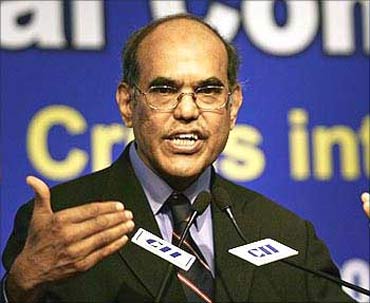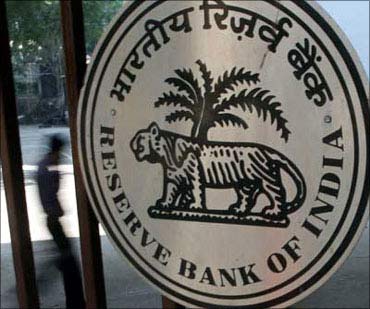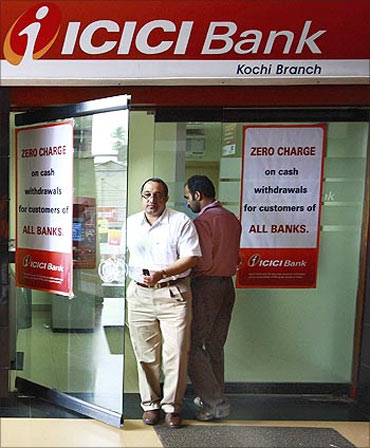Photographs: Reuters
Banks have advised the Reserve Bank of India against allowing industrial houses to enter banking space, even as industry associations, NBFCs and MFIs have been in favour of corporates into banking.
"Banks were not in favour of the proposal due to the unsavoury past experience in India and abroad and that large capital buffer that would be available to the banks sponsored by industrial/business houses would create an uneven playing field with the existing banks," the Reserve Bank said in a statement.
The RBI also said those who argue against entry of industrial houses to promote banks said any such move will aggravate the already skewed concentration of wealth and political influence, besides creating an uneven playing-field with existing players.
Industry associations and NBFC and MFI sectors have been generally in favour of permitting industrial houses to promote new banks.
. . .
Why banks are against corporates in banking
Photographs: Reuters
The arguments in favour are based on the premise that talent of industrial and business houses, which have the entrepreneurial and managerial talent in running asset management companies, mutual funds and insurance companies and have successfully penetrated into rural India, could be gainfully harnessed in the banking sector.
"Moreover, industrial houses could bring to banking strong governance practices, management expertise, talent, innovation and global best practices especially in customer service, as they have had a long history in nurturing and developing businesses," those in favour argued.
They further said financial inclusion requires higher scale of operations which the industries would be able to bring by deploying large capital.
Those against granting such licenses fear that there would be "connected lending" by combining banking and commerce.
. . .
Why banks are against corporates in banking
Photographs: Reuters
"India does not have enough experience in supervising in a scenario where banks are owned by diversified corporates, and allowing such ownership could have serious potential disasters," these arguments said.
They also said India already has a concentrated wealth structure, which influences political decisions.
"Allowing industrial houses to own banks will exacerbate the concentration of economic power and political influence," they said.
The RBI had come out with a discussion paper in August this year on granting of new banking licenses, giving pros and cons of various scenarios.
. . .
Why banks are against corporates in banking
Photographs: Reuters
Diverse views were also received on other asked questions like minimum capital requirements for new banks, promoters' and foreign shareholding in new banks and conversion of NBFCs into banks or promoting new banks.
As for the minimum capital requirement of new banks, the industry chambers and banks were in favour of a high start up capital of Rs 1,000 crore (Rs 10 billion), which would be further raised to Rs 1,500-2,000 crore (Rs 15-20 billion) over a period of time.
However, MFIs and NBFCs preferred a lower start up capital ranging from Rs 300-500 crore (Rs 3-5 billion). "With this capital requirement, it has been argued that 30 to 40 banks could be licenced within a period of next 5-10 years with dedicated focus on financial inclusion," the statement said.
In August, the central bank came out with a discussion paper on entry of new banks in private sector in which it listed the pros and cons of keeping the minimum capital requirement at a low level of over Rs 300 crore, a middle level of Rs 500 crore and a high level of Rs 1,000 crore.
. . .
Why banks are against corporates in banking
Photographs: Reuters
While a low minimum capital requirement may lead to an optimum level of utilisation of resources from the beginning, it may result in non-serious players coming into the field, the RBI had said.
On promoter shareholding in new banks, while the industry associations suggested a range of 40-51 per cent, NBFC and MFI sector preferred a lower range of 30-40 per cent.
On the issue of foreign shareholding in new banks, the RBI said that the suggestions received in this regard ranged from capping the shareholdings at 50 per cent to have no restrictions at all.
Among the industry chambers, while some of them advocated putting a cap at 50 per cent, others have suggested continuing with the existing norm of 74 per cent or not having any restriction for the initial period of 10 years.
The NBFC and MFIs were in favour of retaining the existing norm of 74 per cent or not putting any restriction at all.
On permitting conversion of NBFC into banks or promoting new banks, while some industry associations were of the view that conversion of NBFC should not be permitted due to difficulty in aligning its business model. Other industry associations were generally in favour of conversion or promotion of new banks by NBFCs.
Banks were in favour of allowing only standalone NBFCs to promote banks and at the same time debarring NBFCs sponsored by industrial houses.






article